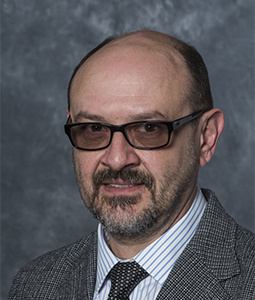School of Medicine Columbia
- SC.edu
- Study
- Colleges and Schools
- School of Medicine Columbia
- About
- Faculty and Staff
- Gerardo G. Piroli
Faculty and Staff
Gerardo G. Piroli, Ph.D.
| Title: | Research Assistant Professor of Pharmacology, Physiology & Neuroscience |
| Department: | Pharmacology, Physiology & Neuroscience School of Medicine Columbia |
| Email: | Gerardo.Piroli@uscmed.sc.edu |
| Phone: | 803-216-3530 |
| Office: |
Pharmacology, Physiology & Neuro |

Training
Assistant Professor
Biochemistry, University of Buenos Aires School of Medicine
Postdoctoral
The Rockefeller University, University of Buenos Aires (Argentina)
PhD
Biochemistry and Physiology. University of Buenos Aires School of Pharmacy and Biochemistry
BSc
Biochemist and Pharmacist. University of Buenos Aires School of Pharmacy and Biochemistry
Research
In Dr. Norma Frizzell’s lab, we study a chemical modification of proteins called “succination” that occurs when fumarate –an intermediate of the Krebs cycle– reacts with sulfhydryl groups of cysteine residues in proteins. This reaction was initially described by Dr. John Baynes and colleagues in the Department of Chemistry and Biochemistry of this University. To our knowledge, succination is irreversible and as a result of this reaction the modified protein may lose activity.
My main interest is to know how succination can contribute to the deficits observed in mitochondrial diseases, a group of genetic deficiencies that affect the functionality of these organelles. The incidence of mitochondrial diseases is about 1:5,000-1:10,000, and due to reduced energy production the organs/tissues with high energetic demand such as the brain and muscle are greatly affected. Using a combination of two-dimension immunoblotting and mass spectrometry, we have recently described that the voltage-dependent anion channel (VDAC) is a target of succination in the brain of the Ndufs4 KO mouse, a model of a mitochondrial disease called Leigh syndrome. As VDAC is a mitochondrial membrane protein involved in the trafficking of ATP, we currently propose that the reduced energy production due to the genetic deficiency might be further potentiated by the altered shuttling of ATP to the cytosol of the cells. We are also interested in other possible targets of succination in the brain of the Ndufs4 KO mouse. In addition, we are in process of testing the use of antioxidants and drugs that act as alternative electron carriers –to bypass the genetic deficit–to decrease the succination load in order to achieve beneficial effects on our mouse model.
Recent Publications
- Manuel AM, Walla MD, Faccenda A, Martin SL, Tanis RM, Piroli GG, Adam J, Kantor B, Mutus B, Townsend DM, Frizzell N. Succination of protein disulfide isomerase links mitochondrial stress to endoplasmic reticulum stress in the adipocyte during diabetes. Antioxid Redox Signal. 2017 May 19. doi: 10.1089/ars.2016.6853. [Epub ahead of print]
- Ruecker N, Jansen R, Trujillo C, Puckett S, Jayachandran P, Piroli GG, Frizzell N, Molina H, Rhee KY, Ehrt S. Fumarase deficiency causes protein and metabolite succination and intoxicates Mycobacterium tuberculosis. Cell Chem Biol 24:306-315, 2017. doi: 10.1016/j.chembiol.2017.01.005. Epub 2017 Feb 16.
- Jeong HW, Choi RH, McClellan JL, Piroli GG, Frizzell N, Tseng YH, Goodyear LJ, Koh HJ. Tribbles 3 inhibits brown adipocyte differentiation and function by suppressing insulin signaling. Biochem Biophys Res Commun. 470:783-791, 2016.
- Piroli GG, Manuel AM, Clapper AC, Walla MD, Baatz JE, Palmiter RD, Quintana A, Frizzell N. Succination is Increased on select proteins in the brainstem of the NADH dehydrogenase (ubiquinone) Fe-S protein 4 (Ndufs4) knockout mouse, a model of Leigh syndrome. Mol Cell Proteomics 15:445-461, 2016.
- Grillo CA, Piroli GG, Lawrence RC, Wrighten SA, Green AJ, Wilson SP, Sakai RR, Kelly SJ, Wilson MA, Mott DD, Reagan LP. Hippocampal insulin resistance impairs spatial learning and synaptic plasticity. Diabetes 64:3927-3236, 2015.
- Tanis RM, Piroli GG, Day SD, Frizzell N. The effect of glucose concentration and sodium phenylbutyrate treatment on mitochondrial bioenergetics and ER stress in 3T3-L1 adipocytes. Biochim Biophys Acta 1853:213-221, 2015.
- Piroli GG, Manuel AM, Walla MD, Jepson MJ, Brock, JWC, Rajesh MP, Tanis RM, Cotham WE, Frizzell N. Identification of protein succination as a novel modification of tubulin. Biochem J 462: 231-245, 2014.
- Piroli GG, Reznikov LR, Grillo CA, Hagar JM, Fadel JR, Reagan LP. Tianeptine modulates amygdalar glutamate neurochemistry and synaptic proteins in rats subjected to repeated stress. Exp Neurol 241:184-193, 2013.
Teaching
Main Courses
- Pharmacology (Medical Students): Small Group Discussions on Pharmacokinetics and Pharmacodynamics and a full set of Lectures and a Flipped Class on Antimicrobials.
- Biochemical Basis of Disease (Medical and Graduate Students): Lectures on Pentose Phosphate Pathway, Proteoglycans and Glycoproteins, and Integration of Carbohydrates and Lipids Metabolism.
- Biomedical Pharmacology (Nurse Anesthesia Program): Lectures and Clinical Cases on Antimicrobials.
- Physiology (Medical Students): Small Group Discussions on Endocrinology.
Additional teaching in Graduate Student Courses in our Department includes Lectures on Signal Transduction, Metabolism, and Stress and the Hypothalamic-Pituitary-Adrenal Axis